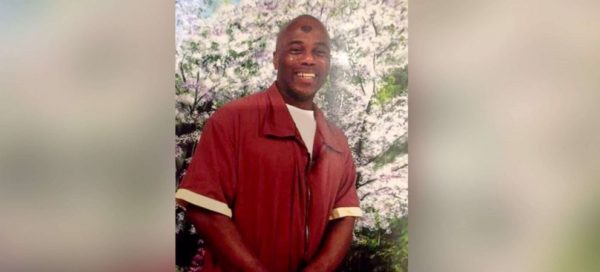‘What’s the Price for Stealing His Life?’: Ben Crump Sues the City of Philadelphia on Behalf of Black Man Wrongfully Incarcerated for 31 Years
A Philadelphia Black man who was exonerated this year after he served 31 years behind bars on wrongful murder convictions, 25 years on death row, has now enlisted civil rights attorney Ben Crump and is suing the City of Brotherly Love for $100 million.
Christopher Williams, now 61, was released from prison in February after the Philadelphia District Attorney’s Office Conviction Integrity Unit re-examined his cases and concluded that he had been railroaded into convictions on four murder charges dating to 1989.
Christopher Williams (Death Penalty Information Center/deathpenaltyinfo.org)
Authorities found evidence of prosecutorial misconduct that included secret deals to get witnesses to lie in court and exculpatory evidence that was hidden from the defense after what became a total of six murder charges were brought against him following his arrest 1989.
On Wednesday, Dec. 1, Willams his name now cleared, stood beside his lawyers at a news conference to announce the multi-million lawsuit that names the city, the Philadelphia Police Department, Philadelphia District Attorney’s Office, as well as 17 police detectives or their estates, two former assistant district attorneys, and former district attorney Lynne Abraham as defendants.
“I didn’t go to weddings. I didn’t see childbirths. You’re talking about 25 grandchildren. I didn’t see none of them come into the world,” he lamented.
The exonerated man’s ordeal began on Dec. 16, 1989, when the then-29-year-old Williams, a carpenter and father of five, was arrested on charges of murder after a witness implicated him in the June 1989 shooting death of a 19-year-old man.
Some 14 months later in February 1991 prosecutors added charges in the November 1989 slaying of 19-year-old Michael Haynesworth, who was found bound, beaten, and shot in his car.
By the summer of 1993 Williams would be charged with four more murders, including the February 1989 slaying of a cab driver and the September 1989 shootings of three reputed drug dealers whose bodies were dumped on streets just hours apart.
The chief witness against him — and several co-defendants — in all of the crimes was a man who knew Williams from the neighborhood: James White. First arrested on charges of murder for killing Haynesworth — the victim used to date White’s girlfriend — in December 1989, White ultimately would plead guilty to all six slayings and agreed to cooperate with the prosecution against anyone he would implicate in exchange for leniency.
Williams was convicted at trial in January 1992 of murdering Haynesworth. Although he was acquitted at trial in August 1993 of killing the cab driver, at the same trial he was convicted in the triple slaying. Those convictions got him sentenced to death row.
White testified at trial that he and his co-defendants tricked the three drug dealers into going into a Philadelphia housing project so that they could buy some illegal guns. Once there, he alleged that they stuck the dealers up for $26,000 and made them get into a van. After the men were in the vehicle, he said they shot the men execution-style and disposed of their bodies in various locations around the city.
Years later, in 2013, he recanted his story about the triple murders. He claimed that a prosecutor had provided him with information about the case and coerced him into testifying against the defendants.
The recantation did not help Williams then, but by February 2019 as his appeals lawyers continued to press his case, District Attorney Larry Krasner reviewed the case through his Conviction Integrity Unit (CIU) and discovered evidence that proved Williams and co-defendant Theophalis Wilson had been wrongfully convicted.
The CIU chief, Patricia Cummings, commented in the files on the investigation after the triple slaying case unraveled, “We believe there are indeed Brady [referring to the Supreme Court ruling requiring the prosecution to turn over exculpatory evidence to the defense] violations. We find that to be incredibly troubling.”
But even after Williams was exonerated of the triple murders in December 2019, the Haynesworth conviction still stood against him. It wasn’t until February of this year that Philadelphia Common Pleas Court Judge Tracy Brandeis-Roman tossed out that fourth conviction against Williams and he could come home.
The DA’s office agreed that White and at least one other key witness at Williams’ trial for Haynesworth’s slaying were compromised and not credible. (Last week a second man convicted of murdering Haynesworth on the basis of White’s testimony, Troy Coulston, also was exonerated.)
The current theory of the cases is that White alone killed the six people and just said that Williams “masterminded” the play to get less time. Files show that in 1989 police believed Williams to be running a crew at that robbed drug dealers and he was in their sights.
Williams, after maintained his innocence all along, has been exonerated, and now is seeking financial restitution for the years that he lost.
Crump suggests that this case should be seen as “a historical teachable moment for America.”
The lawyer further suggests (although Williams was only convicted of four of the six murders) that this exoneration is historic because of the length of time he served in prison and on death row.
He continued, “Chris Williams … is almost like the symbol for wrongful conviction of Black men in America. We have to be better than this.”
“We cannot continue to let racism cloud our judgment when it comes to not even just wrongful convictions but administering justice,” he demanded. Skillfully orchestrated, the high-profile lawyer asked the gathered media, “What is the price for stealing his life?”
Williams’ sister, son Chris, nephew, and others around him held up signs echoing the sentiment.
The price Williams has set is $100 million in compensatory and punitive damages.
More news from our partners:

